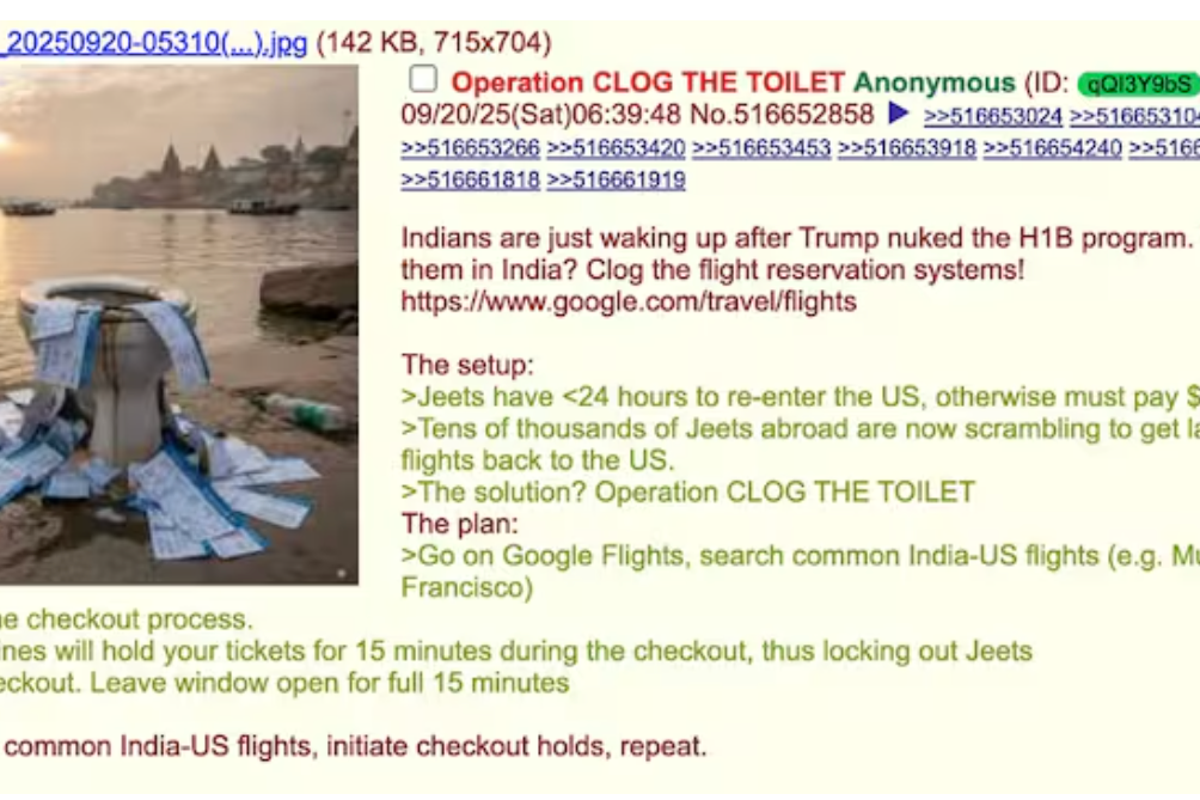
Users of the right-wing forum 4chan attempted to stop Indian people from returning to the U.S. in response to President Donald Trump’s H-1B visa overhaul by block-booking plane seats over the weekend as part of a prank dubbed “Operation Clog the Toilet.”
After Trump announced on Friday that applicants for H-1B visas would be subjected to a $100,000 fee, rather than being granted them via a lottery system, several major corporations, including Amazon, Microsoft, and JPMorgan, instructed their employees to stay in the U.S. or return home from foreign travel as soon as possible to avoid the financial penalty.
The White House later clarified that the fee would not apply to existing visa holders, only new applicants, but not before the president’s announcement had caused tickets for flights from New Delhi to New York’s John F Kennedy Airport to double in price from INR40,000 ($450) to INR80,000 ($900) as Indian workers rushed back to North America, <a rel="nofollow" target="_blank" href="https://www.indiatoday.in/according to India Today.
Seeking to capitalize on the panic, 4chan users came together to book up plane seats – without actually completing the purchase – to spread further chaos and drive up the ticket price.
“Indians are just waking up after the H1B news,” a post on the forum’s “patriots.win” thread read. “Want to keep them in India? Clog the flight reservation system!”
The post, accompanied by an AI image of a toilet overflowing with boarding passes, instructed followers to use Google Flights to look up common flights between India and the United States, choose a seat and begin the checkout process without completing it to initiate a 15-minute hold on that seat, preventing real customers from purchasing it.
“I got 100 seats locked,” one user subsequently claimed, relishing the turmoil being faced by India’s airlines.
4chan, founded in 2003, is an imageboard that has long been associated with internet trolls, conspiracy theorists, and the alt-right, on which users share juvenile memes and occasionally illegal content, mostly anonymously.
Trump’s visa announcement last week stunned and confused employers, students, and workers from the United States to India and beyond, particularly before White House Press Secretary Karoline Leavitt clarified that the expensive fee would not be applied retroactively.
The visas were first introduced under the 1990 Immigration Act to allow American companies to bring in people with technical skills and qualifications that are hard to find in the U.S.
They are not intended for individuals who wish to reside permanently. Some eventually do, but only after transitioning to different immigration statuses.
There are currently “around 700,000 H-1B visa holders in the country and another half a million or so dependents,” according to Capital Economics commentator Stephen Brown.
The attempt to derive a profit by selling the coveted visas has driven a wedge between Trump’s MAGA movement, which consists of both anti-immigrant constituents, such as Laura Loomer and Steve Bannon, who hope to deter new arrivals, and entrepreneurial tech figures like Elon Musk and Vivek Ramaswamy, who want to encourage them.
The president himself has offered contradictory statements about their value, telling The New York Post over the weekend that he “always liked” the visas, despite labelling them “very bad” and “unfair” to American workers on the campaign trail in 2016.
